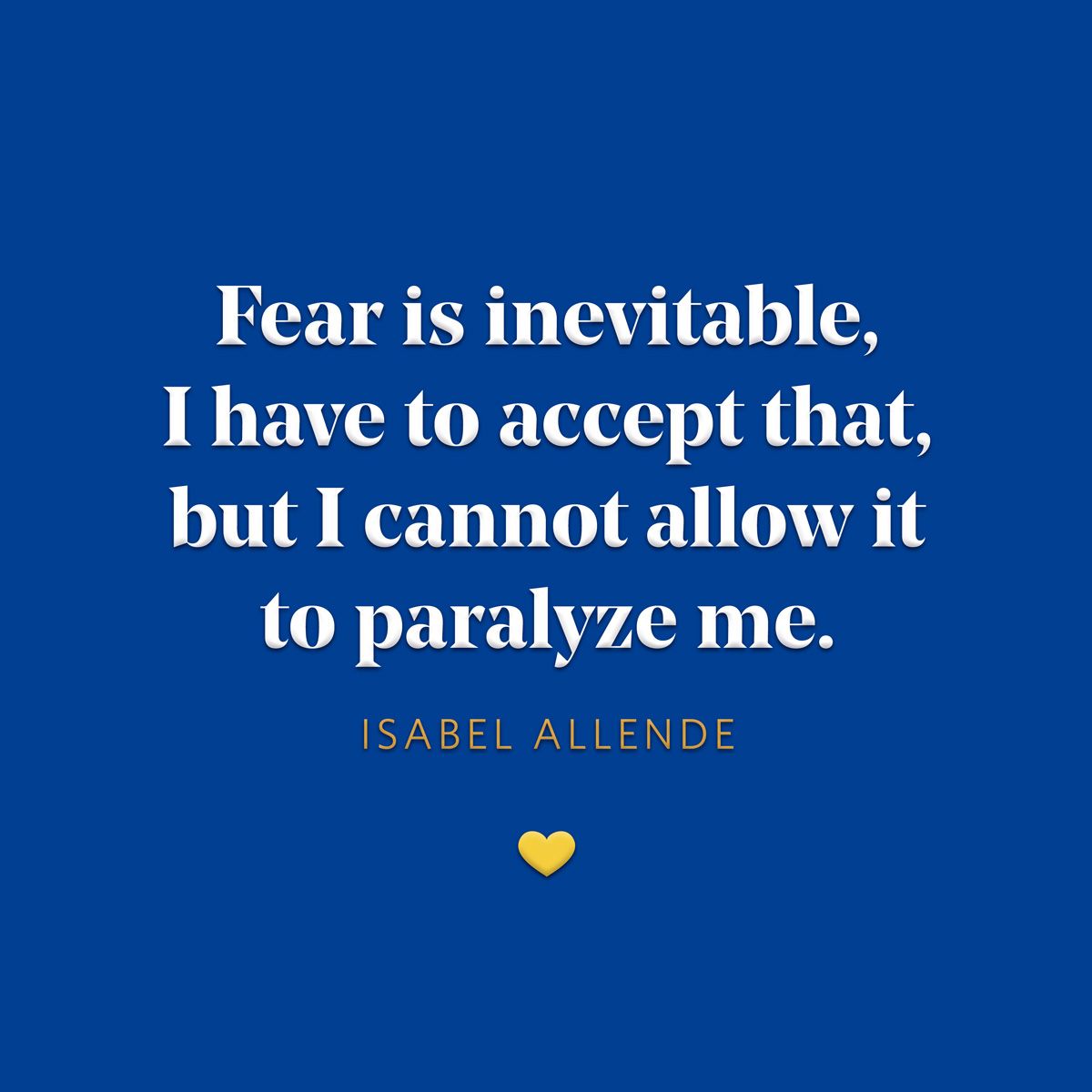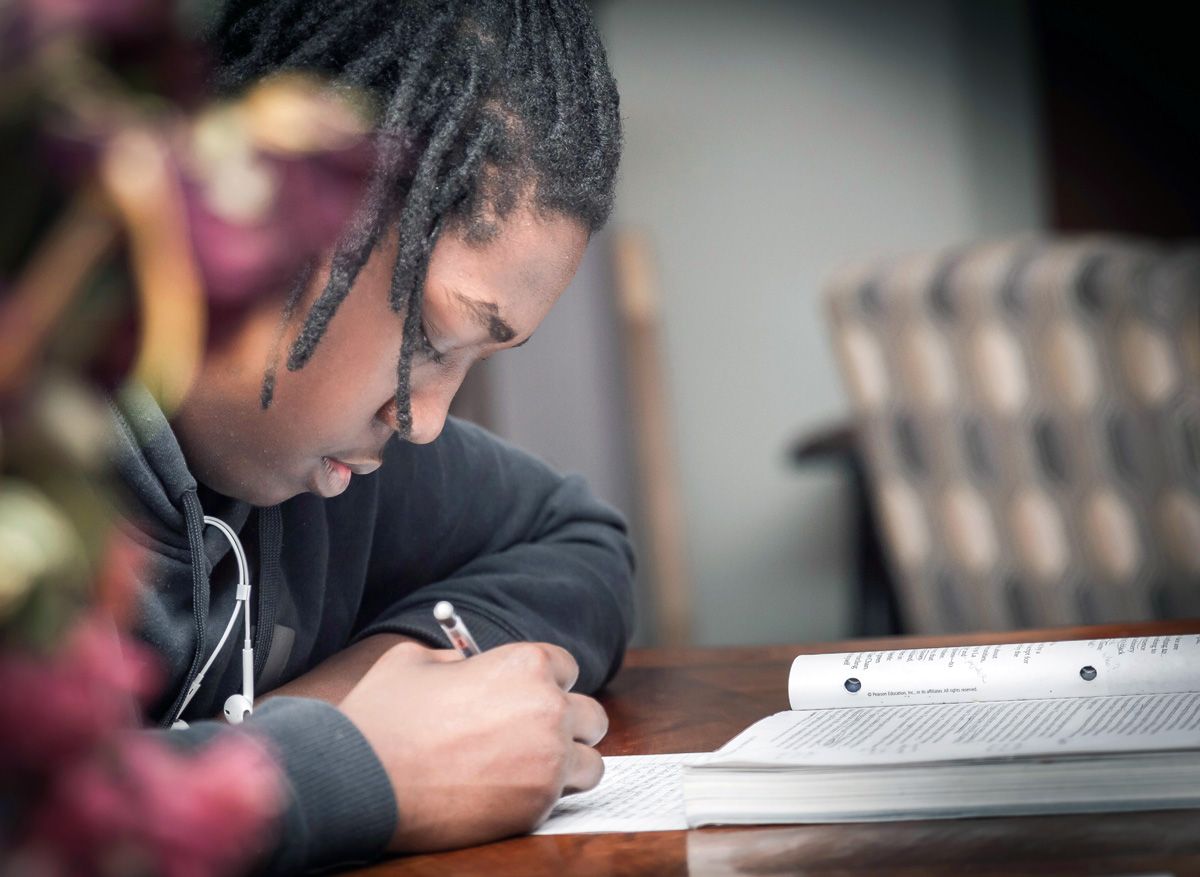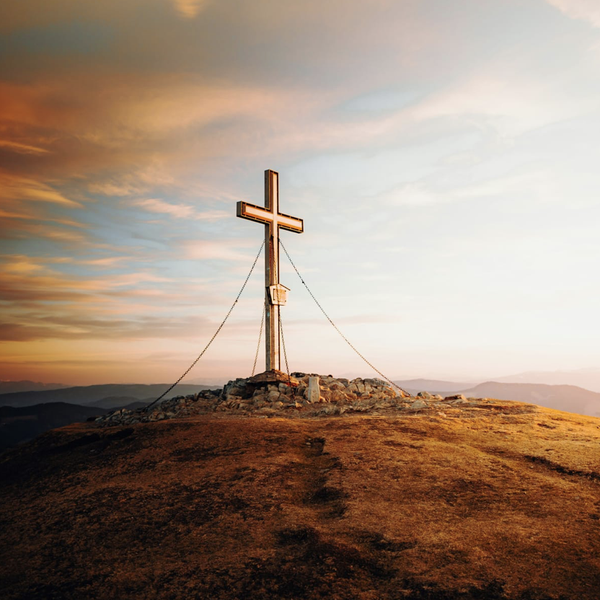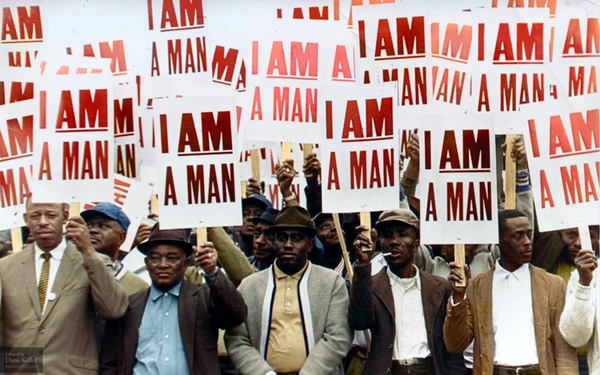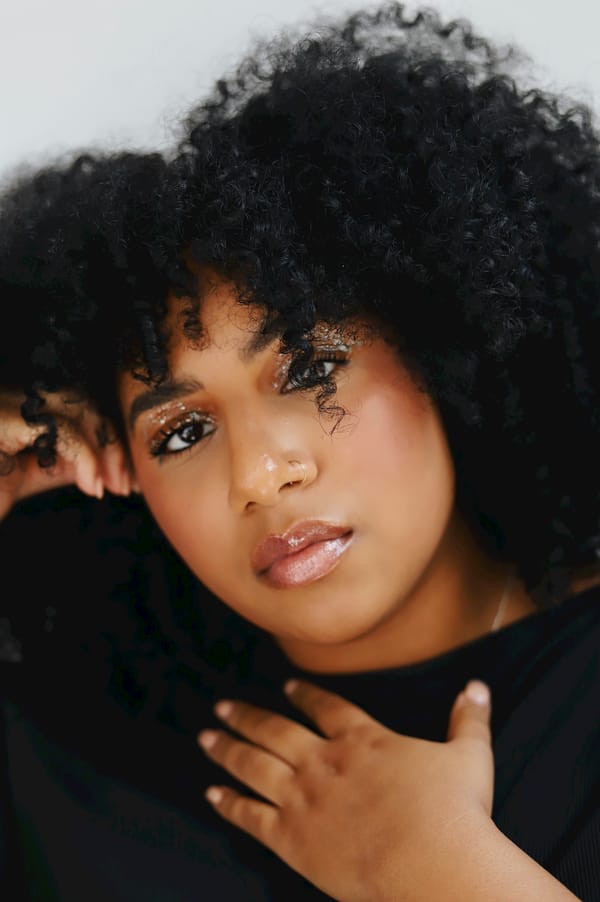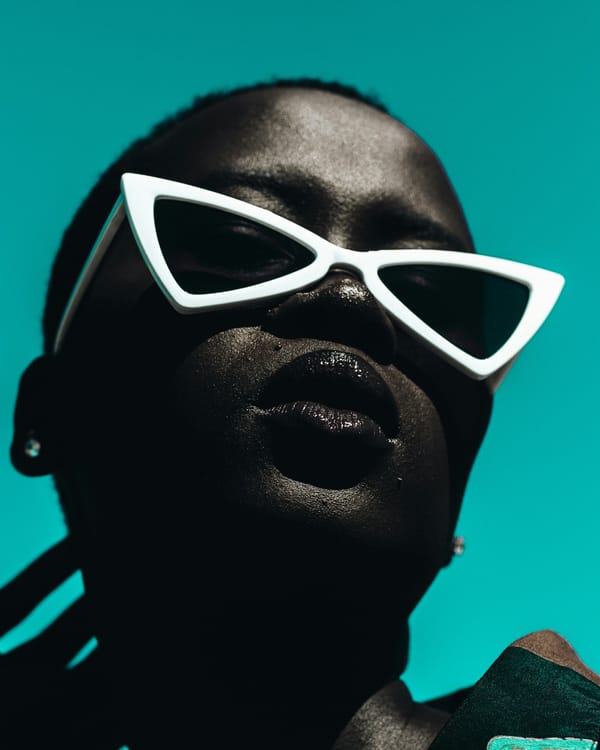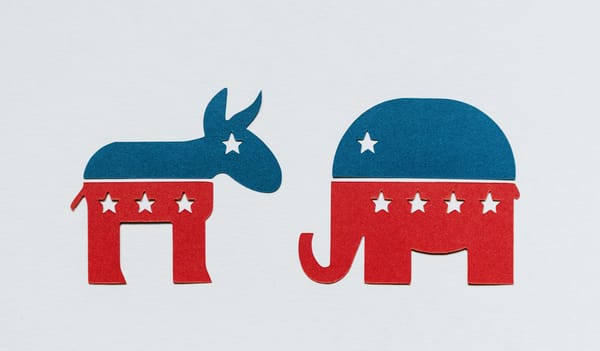Editor’s Letter
I hope you’re having a relaxing weekend with no shooters (active or otherwise) in your neighborhood or dangerous weather on the horizon. Can you believe what happened in Tennessee, Arkansas, and Mississippi? Mother Nature is all beautiful and life-affirming until she decides she wants to destroy everything with a barrage of tornadoes. [Shudders.] Please keep the survivors of these disasters in your prayers. If you’ve ever lost your home and everything in it in one fell swoop, you know how traumatic the recovery can be.
If the title of this week’s newsletter looks a little familiar, that’s because it should. It’s a nod to one of the first articles I ever wrote about racism, but this issue is not a redux of that article. This week’s feature is my recent interview with The Daily Edge editor, novelist, creator, Richard Hine, a former media executive (Wall Street Journal, Time, and Adweek) turned novelist and independent journalist.
We address several topics dramatically affecting the lives of many across the country and . . . well, I don't want to tell you too much. Kick back and enjoy.
Clay Rivers
OHF Weekly Editor in Chief
NEW THIS WEEK
Talking to White People About Racism
By Richard Hine, The Daily Edge
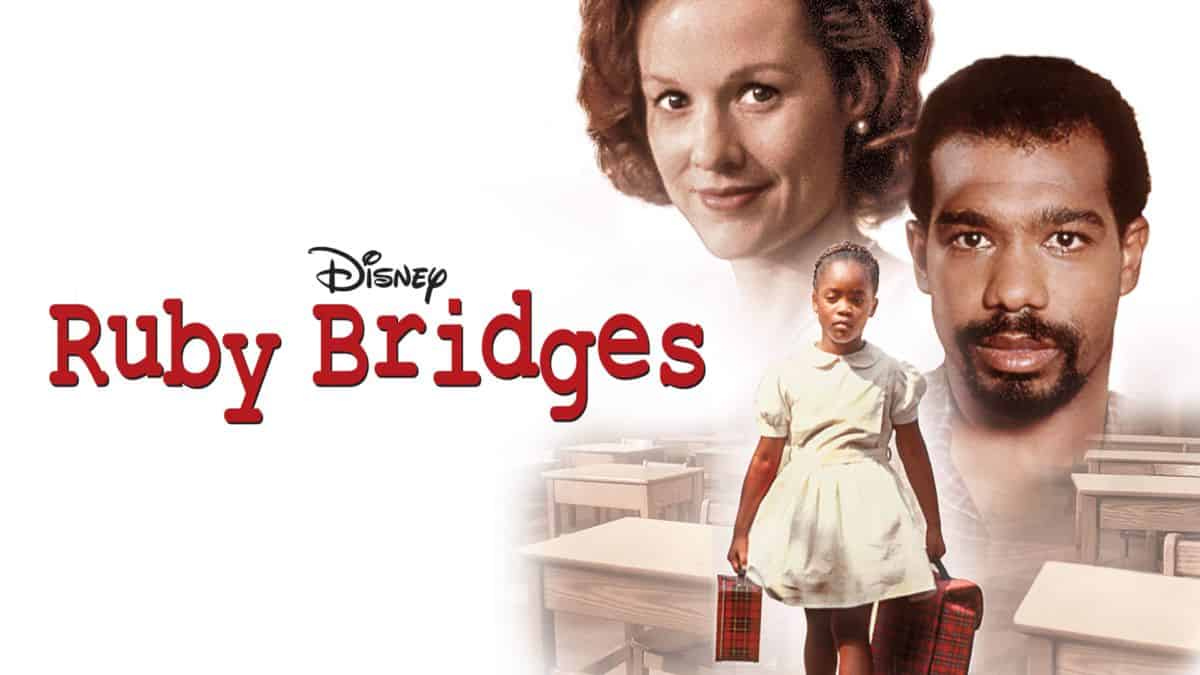
Cancel culture is real. Especially when it comes to Black history and the “discomfort” it might cause snowflake white children being raised in pro-gun, anti-book “Christian” homes.
In fact, it’s gotten to the point where even PG-rated Disney movies depicting real events are getting banned in schools.
That’s what happened this week when a lone parent was able to have the Disney movie “Ruby Bridges” banned in a Pinellas County, Florida school, despite it having been shown without complaint for years before now.
In 2023, the sanitized 1998 telling of a true story of what happened in 1960 is too much for Florida kids to handle. And the episode veered into “1984” territory when the school district launched into “doublespeak” to claim that the accurate reporting that the school had cancelled all showings of the film didn’t actually constitute a “ban.”
This is just the latest example of Black history getting cancelled in Florida (and other Ultra-MAGA states)—along with the growing movement to ban books with LGBTQ+ content in the hate-filled, dark-money funded effort to erase individual identities along with national history.
Florida . . . Disney . . . Racism . . . LGBTQ+ Erasure . . .
. . . Clearly, it’s time for me to check in again with my friend Clay Rivers, who I interviewed here in 2020 and here in 2022. As I wrote last year:
In his 2012 memoir “Walking Tall”, Rivers introduced himself as “Short. Black. Christian. And gay.” His 2015 essay “How I Talk to White People About Racism” was published in the New York Times’ feature “A Conversation About Race.” And since 2019, he has been both the Founder and Editor-in-Chief of Our Human Family (OHF Weekly), an online magazine about achieving equality with the mission of “fostering meaning conversations that broad perspectives and offer hope.”
As readers of his memoir know, Clay Rivers is also a former Disney employee, with a storied career that began at Walt Disney World Resort in Orlando, Florida and encompassed roles as art director for Walt Disney World Resort Design and The Disney University, The Disney Stores, Disney Imagineering, and Disney Consumer Products.
With all that’s going in Florida and beyond, I sent the Orlando-based Rivers a few more questions which he answered via email.
Q & A with Clay Rivers
In a recent Editor’s Letter for OHF Weekly, you wrote: “Our forced labor, blood, sweat, and tears quite literally built the United States… Black history is American history. To learn this chronology will only unite, not splinter, the nation.” How do you respond to what’s happening in schools and colleges today regarding teaching Black history—and the imperative not to teach anything that will cause “discomfort” to white students?
Clay Rivers: The more than 400 years of Black history, from the first Africans through today, is a cruel and inhumane story, but it is also a history of fortitude, resilience, ingenuity, hope, and survival in a land of vicious and oppressive enslavers. It is also inextricably woven into the fabric of America.
I’m disheartened by the movement to eradicate Black history from the American educational system, but it’s neither unexpected nor is it new. I just never thought it would happen in my lifetime. Noted Harvard professor, historian, and author, Dr. Henry Louis Gates refers to the period after Reconstruction as the former Confederacy’s Redemption, “when the gains of Reconstruction were systematically erased and the country witnessed the rise of white supremacist ideology that, we might say, went rogue.” That’s what we’re experiencing now. Conservative Christians et al are attempting to erase the teaching and cease the discussion of the actual history of Black Americans.
But I’m also encouraged because the thinly veiled anti-Black hate and vitriol Black people have spoken about for decades have been given permission to shamelessly strut and preen about in public for all the world to see. Hoods and robes not required, see Charlottesville. Keep in mind, the folks who, at the mere mention of racism, segregation, and the fight for civil rights, are experiencing all this manufactured self-professed unbearable discomfort are the very same people who respond with rabid jeers of “F— your feelings,” whenever the shoe is on the other foot.
What of the discomfort of the Groveland Four, Emmett Till, the residents of Rosewood, and the countless men, women, and children lynched from sea to shining sea? What of their discomfort? If the ancestors of Black, Indigenous, and People of Color can live through the aftermath of those events, white descendants can surely live through the telling of those events.
The hypocrisy astounds me.
From that which we create or innovate to our physicality, the Black influence is writ large across America and its culture. Despite a rapacious hunger for the next Black-inspired trend to cannibalize/capitalize, this country loves Black culture; but Black people, not so much. Are white students truly so emotionally fragile that they will dissolve into ethereal nothingness at the mere mention of a history that is not Euro-centric? Come on now. We all—and I do mean “all”—know better than that.
Dr. Carter Woodson, the founder of what has become Black History Month, wrote “If a race has no history, it has no worthwhile tradition, it becomes a negligible factor in the thought of the world, and it stands in danger of being exterminated.” Essentially, what we’re experiencing is a concerted effort to rob America in general of its full history and Black Americans specifically of our legacy. This is no accident.
In one recent example of allowing white parents to dictate what all children get to learn, one Florida mother complained about—and got cancelled—screenings of “Ruby Bridges,” a 1998 PG-rated film about the Louisiana 1st grader who braved angry mobs to become the first Black child at a previously all-white school. What does it say about America when what a first grader lived through in 1960 is deemed too “controversial” for second graders to learn about 2023?
CR: It speaks volumes about the poisoned heart of America more than people realize.
First teachers are certified to hold those positions, many study years to enter the profession. And so entire school boards and teachers’ unions must now bend the knee to the will of a single parent who has a beef with a lesson that they subjectively feel is inappropriate for their child? Not so long ago, if parents disagreed with a specific lesson, they had the option to keep their child home from school that day. They still have that right. They should exercise it.
Let’s be clear here.
Ruby Bridges didn’t capriciously waltz into William Frantz Elementary School to bring chaos. The Supreme Court of the United States ordered the desegregation of public schools. The city of New Orleans provided a qualifying test for Black students to attend white schools. Much to their chagrin, Bridges was one of six children who passed the rigorous written test designed to weed out all Black students and maintain segregated schools. She would be the first, youngest, and only Black student to attend an all-white elementary school in the South.
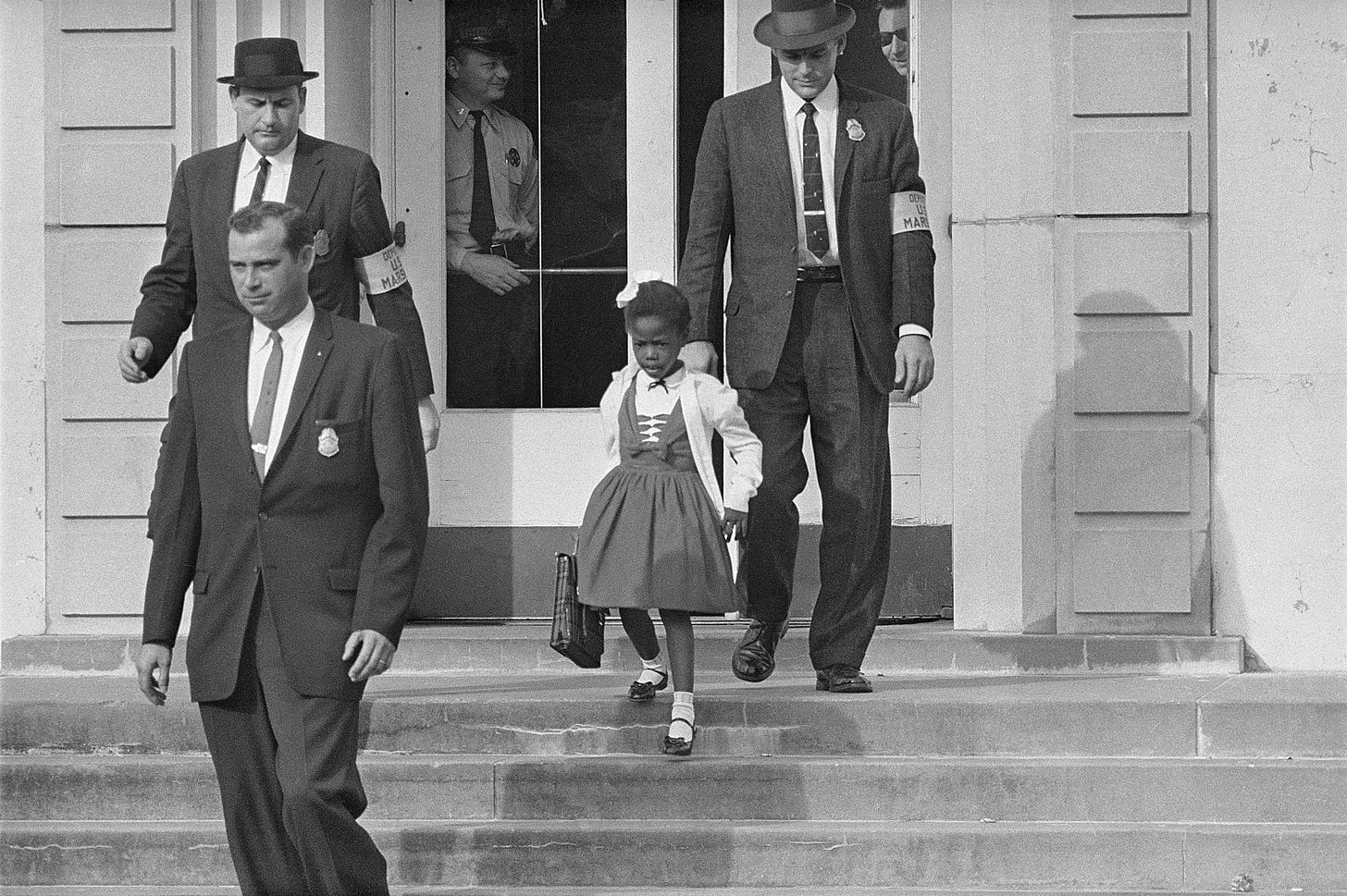
After five months of stalling and resisting a federal court order, Louisiana’s state legislature allowed desegregation in November 1960. For the remainder of the school year, Bridges was driven five blocks to and from school under the protection of four federal marshals because of racist mob violence. Think on that for a minute. For the majority of a school year, seven out of nine months, a six-year-old child had to be protected by armed United States marshals from the reach of a mob of white people who so hated her that they didn’t want her to attend their school. The racism didn’t end at the school’s front doors. The parents of Ruby’s would-be classmates withdrew them from Ruby’s class and none of the other teachers would teach her because of their unbridled racism. All, except one. Barbara Henry, a teacher from Boston who was new at the school that year.
That any child would be subjected to the jeers and racist behavior Ruby Bridges faced is shameful. My heart broke all over again retelling Bridge’s story because I started first grade six years after Ruby. 1960 was not that long ago. If white readers aren’t moved by reading the facts of what happened to this brilliant six-year-old girl, I entreat you to imagine your six-year-old in a similar situation. You don’t have to be Black to relate to this facet of Ruby’s story, you only have to be human. People need to accept the fact that the Black experience is a human experience.
Toni puts readers squarely in the heart and soul of her characters. In doing so she reveals for some an unimagined humanity inherent to Black people and all humankind.
While Ruby’s experience was the first, it was not a singular event. With the increasing frequency of Black children integrating white grade schools, incidents like Ruby’s took place all across the country.
The film Ruby Bridges is an award-winning, 1998 TV movie by Disney. The point of telling Ruby’s story is not to shame or incite an overthrow of schools by second graders. The benefits of sharing these factual and historical events are manifold. First, by examining what happened, to whom, and why, we lessen the likelihood of these events happening again. Second, kids and adults grow in their understanding that we share more in common than what separates us. Third, we learn to appreciate and value the differences in others. Fourth, children learn empathy.
One of the most banned authors in American schools today is Nobel Laureate Toni Morrison, an author to whom you recently devoted an entire edition of OHF Magazine. Why do you think her work is being banned? What are today’s students being deprived of because of this censorship?
CR: The long answer: Toni Morrison’s work is being banned because her work fearlessly depicts Black people front and center as the main characters within the context of Black culture, hopes, trauma, relationships, and dreams. Toni puts readers squarely in the heart and soul of her characters. In doing so she reveals for some an unimagined humanity inherent to Black people and all mankind. It’s one thing to observe a character in a detached, third-person manner. It’s quite another to identify with and understand not only what her characters feel, but why they feel the way they do.
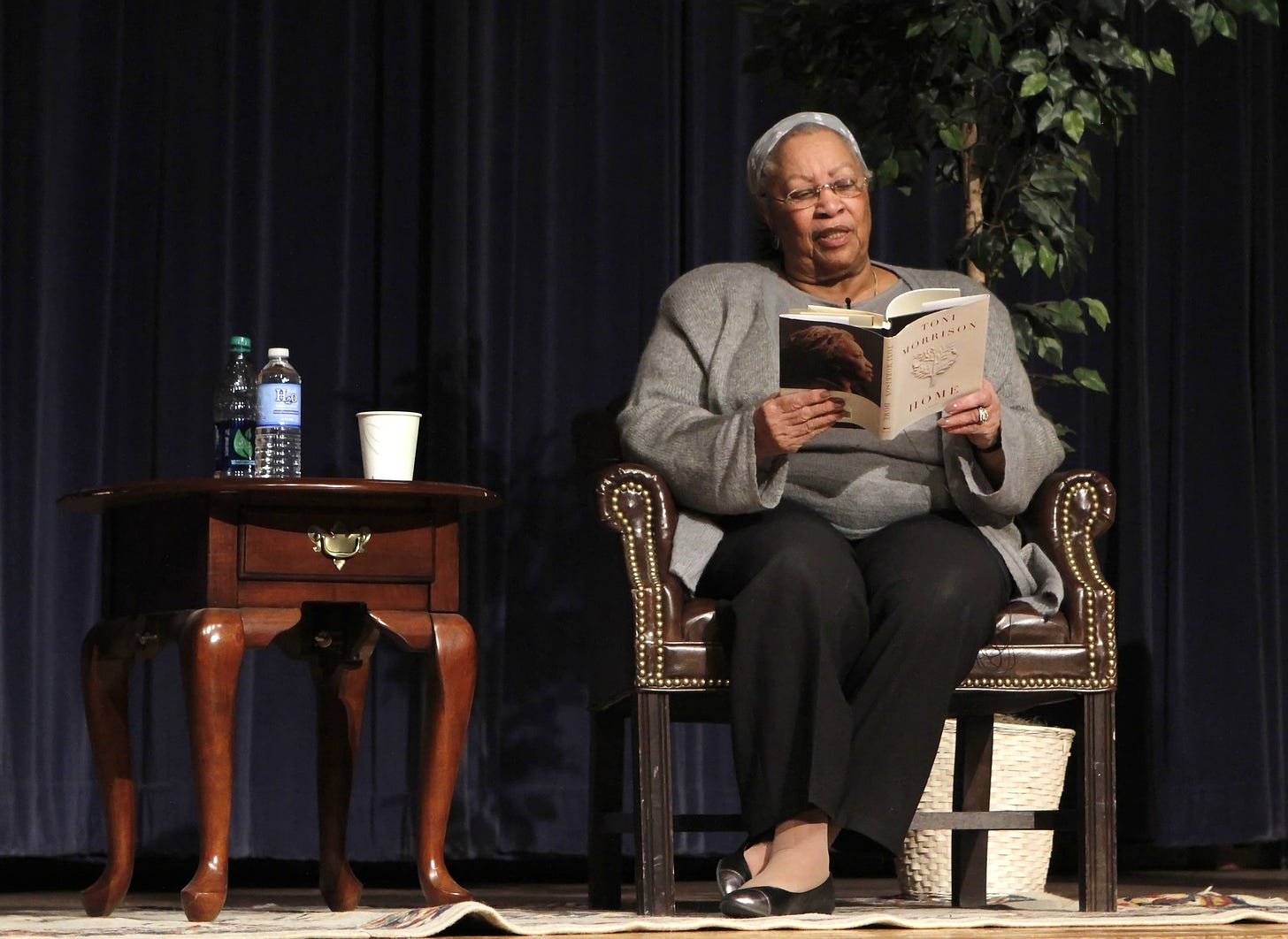
Diving into a Toni Morrison novel is an enlightening process in which white people often discover their long-held biases about Black people are unfounded, and virtues they reserved only for themselves also hold true for Black people. To have the unfeeling rock in one’s chest transformed into one of flesh and blood isn’t a mere paradigm shift. It’s a heart transplant.
What are today’s students being deprived of because of this censorship? They’re missing out on the opportunity to become more fully human, to grow in their understanding of what it is to be human.
The folks who seek to ban Toni Morrison’s books are content with their hearts being three sizes too small. They’re content to wallow in their ignorance of the fact that theirs is not the only way to experience life. They fear having to reconcile the reality that their beloved Meemaw and Peepaw may have been active participants in one of history’s greatest crimes against humanity: the enslavement of Black people in America. They fear having to admit . . . wait for it . . . they were wrong.
The short answer: Banning books by Nobel Laureate and Pulitzer Prize winner Toni Morrison serves two purposes: 1) It keeps people ignorant because they aren’t challenged to grow, reconsider, or evolve in the light of facts they’re unaware of, 2) Banning books by any Black perpetuates anti-Black sentiment while upholding white supremacy.
The New York Times featured your essay “How I Talk To White People About Racism” in a feature called “A Conversation About Race” back in 2015. A lot has changed politically since then. Do you think the conversation is any easier now?
CR: Ha! That depends on who you’re speaking with. The world was a very different place eight years ago. The 2020 murder of George Floyd was the tipping point for a lot of Americans. Who will ever forget the scores of people who protested against the acts of police brutality? The footage of Mr. Floyd’s murder was proof positive of what many Black people had been saying for decades: that racism is real and a number of law enforcement officers were killing unarmed Black people without provocation. If not for the footage of Mr. Floyd’s murder and the testimony of the bystanders, the conviction of the police officers involved might never have happened. Their conviction set the precedence for the conviction of Ahmaud Arbery’s killers. The inconceivable became a reality.
On one level, I think people of different ethnicities are more likely to engage in conversations about racism as a result of well-known, well-documented contemporary instances people can use as a shared frame of reference. Now what happens during and the outcomes of those conversations, that’s a-whole-nother topic. Outcomes depend on whether or not the participants are willing to treat each other with respect and care, and willing to practice listening.
One thing I’d like to add to that original article is that when people engage in conversation about racism, they both have to be willing to extend a little grace to each other and themselves. No one has the skill to spontaneously deliver words and thoughts in precisely the right way to perfectly convey their ideas without misinterpretation. On the fly. To everyone. It’s impossible. As long as there are humans involved in conversations, there will always be some degree of misinterpretation. You use a word or phrase that has a benign meaning to you, but that same word or phrase more than likely has a different meaning to me. And vice versa.
When we engage with people it’s incumbent upon participants to remember that people will make mistakes or clumsily say something not to intentionally be offensive, but simply because they lack the skill or nuance. Then what are we supposed to do? We ask for clarification without intentionally putting the other person on the defensive. Yes, it takes work. For some people, it’s too much work, and that’s okay. No one is obligated to give an account of their experience, but at the same time, no one is obligated to listen to someone else’s rationale. This is why people have to treat one another with respect and care, listen with the intention of learning, and have the willingness to extend the other person a little grace or wiggle room.
That’s not to say there aren’t bad actors out there. There are. And there are plenty of them. My personal strategy is to leave them to their own devices. Bad actors aren’t interested in anything I have to say, so why waste my time. I’m not here for their entertainment.
How will Our Human Family be covering race—and other issues—in the months ahead? Are there any recent articles you’d like to highlight here? Any final thoughts?
CR: Our Human Family will continue to cover racial equity, allyship, and inclusion as we always have, openly and honestly. With this clampdown on Black history that’s in effect, readers can plan to see more stories with a historic bent.
Here are a few of our recent articles your readers can check out—
- “Black History: Learn It and Never Forget”
OHF Weekly fan favorite William Spivey on the relevance of Black achievements, turning points in history, and atrocities committed against Black People - “Groveland: Restoring its Historic Black Cemetery”
OHF Weekly editor in chief Clay Rivers on how the efforts in Groveland, Florida, to restore its desecrated Black cemetery nullify the belief that learning about Black history divides people and makes matters worse - “Racism and Bias in the Media”
OHF Weekly managing editor Sherry Kappel on the racial bias that exists in the news and how that news is reported - “The Way Forward: Race, Gender, Class and Queer Intersectionality as Survival” an address by OHF Weekly writer Max S. Gordon given at Union College for LGBTQ Pride
- And our collection of stories tagged Black History
You know, if things look dark these days, it’s because they are. But even in a world brimming with hatred, violence, and bigotry, we are well served to heed the words of inaugural poet Amanda Gorman. “For there is always light, if only we’re brave enough to see it. If only we’re brave enough to be.”
Richard, thanks for your time. Always a pleasure.
Love one another.
More about Our Human Family:
Our Human Family celebrates the inherent value of all human beings. It is a 501(c)(3) charitable organization that advocates for racial equity and inclusion in America by creating and offering workshops, panel discussion groups, targeting key educational programs for sponsorship, hosting guest speaker events, and much more to help achieve racial equity and inclusion for everyone.

OHF Weekly is a newsletter and website inspired by the reality that despite the racial bigotry, hate speech, and acts of violence, there are scores of people working to make the world—their world, their sphere of influence—more equitable by dispelling the lie of race and the practice of racism, and replacing them with the truth of love and equality.
Subscribe to OHF Weekly and support the work of Our Human Family to help further the national conversation on better race relations and widespread equality in America.
ALSO FROM OUR WRITERS
Life Is a Drag. Can’t We All Just Get Along.
All this hullabaloo happening in Tennessee seems a bit ridiculous . . . female impersonation, also known as “drag,” has been around since the ancient Greeks and was an integral part of Shakespearean theater.
By Scott Willis
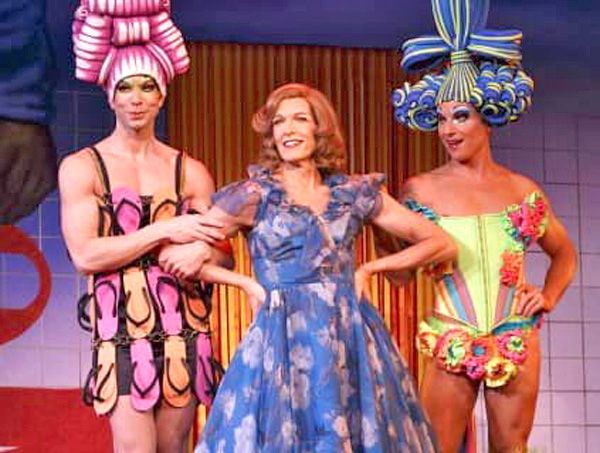
I am particularly proud at this moment in time to announce that I will be returning to Seattle in May to reprise the drag role of Eat Me in the annual burlesque of Through the Looking Glass: The Burlesque Alice in Wonderland, produced by Verlaine & McCann at The Triple Door just around the corner from the famous Pike Place Market in downtown!
In addition, I am incredibly excited to have been asked to direct this season’s production. Of course, I’m not kidding myself! Both Lily Verlaine and Jasper McCann have been doing just fine pleasing audiences for over thirteen years with this particular show. I’d like to think I’ll be the third eye and perhaps a performance/acting coach.
The part I’ll be recreating out in the Pacific Northwest was originally performed by BenDeLeCreme, the RuPaul’s Drag Race Artiste favorite of Season 6 and All-Star Season 3. I was thrilled to join the production last fall.
All this hullabaloo happening in Tennessee seems a bit ridiculous to me. I mean, what is drag anyway?
Read the full article at OHF Weekly.
Fieldnotes on Allyship

Fieldnotes on Allyship: Achieving Equality Together is an informal and informative guide to becoming an effective ally and covers four areas: 1) how we as a nation got here, 2) identifying the forces that maintain systemic racism, 3) preparing to be an ally, and 4) serving as an ally.
Want to read an excerpt before you buy the book? No problem. Read the introduction here.
Fieldnotes on Allyship: Achieving Equality Together is available in print, and for iPad, Nook, and Kindle. Digital editions are also available in Australia, Canada, France, Germany, Italy, Japan, Mexico, and the United Kingdom.
Final Thoughts
